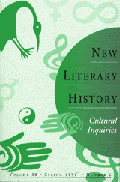
Abbreviated title(s) NLH
Discipline Literature
Language English
Publication details
Publisher Johns Hopkins University Press (USA)
Publication history 1969 to present
Indexing
ISSN 0028-6087
New Literary History: A Journal of Theory & Interpretation is an academic journal founded at the University of Virginia where it is still edited, and published by Johns Hopkins University Press. New Literary History focuses on the history and theory of literature, and key questions of interpretation. New Literary History has provided an international forum for scholarly exchange on such issues, publishing in English works from international scholars, and essays in translation.
New Literary History has the unique distinction of receiving six awards from the Council of Editors of Learned Journals.[1]
From its inception in 1969, through 2008, New Literary History was under the editorship of its founder, Ralph Cohen. Beginning in 2009, it is edited by Rita Felski, William R. Kenan, Jr. Professor of English at the University of Virginia.
The journal is published quarterly in February, May, August, and November. Circulation is 1,300 print copies, along with many electronic subscriptions, and the average length of an issue is 220 pages.
History of the Journal
New Literary History was founded as part of the Sesquicentennial Celebration of the University of Virginia in 1969 by Ralph Cohen, professor of English at the university. When founded, according to Cohen, there was no "English literary journal devoted to critical theory or to a reconsideration of literary history, its nature and possibilities. New Literary History was conceived as a move against the critical current; its aim was to inquire into the theoretical bases of practical criticism and, in doing so, to reexamine the relation between past works and present critical and theoretical needs."[2]
The journal publishes essays that deal with the nature of literary theory, the aims of literature, the idea of literary history, the reading process, hermeneutics, the relation of linguistics to literature, literary change, literary value, the definitions of periods and their uses in interpretations, the evolution of styles, conventions, and genres, as well as articles from other disciplines that help interpret or define the problems of literary history or literary study.[3]
New Literary History played a crucial role in expanding the concerns of literary criticism beyond the close reading of individual literary texts, characteristic of The New Criticism, and in introducing British and American scholars to methodologies and theoretical approaches to literature from continental Europe. According to Wolfgang Iser,
It was Ralph Cohen's editorial policy to raise issues that were not in the orbit of the discipline when the journal was launched, such as: What is Literature, History, Interpretation, Criticism, and to what extent does the exploration of these issues require a theoretical approach? Thus basic presuppositions and assumptions of the study of literature came under close scrutiny which, in turn, had to be contextualized in order to trace the provenance of what has been posited in the theoretical approaches concerned.[4]
The journal was characterized by "an attempt to bring Anglo-American criticism into a close interrelationship with Continental approaches to literature and culture; it gave New Literary History a unique profile."[5]
New Literary History has published essays by prominent scholars from a number of fields, including: Roland Barthes, Harold Bloom, Hélène Cixous, Jacques Derrida, Terry Eagleton, Stanley Fish, Jürgen Habermas, Wolfgang Iser, Fredric Jameson, Frank Kermode, Claude Lévi-Strauss, Martha Nussbaum, Richard Rorty, Gayatri Spivak, George Steiner, and Tzvetan Todorov.
In 2001, New Literary History became "the first English-language literary journal to be printed in Chinese," with a selection of its essays translated and published in Chinese annually.[6]

